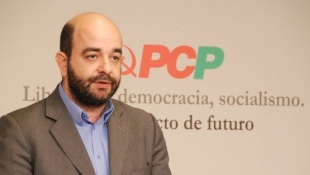Article by Manuela Bernardino, member of the Secretariat of the CC, Responsible for the International Department
The decision (or rather the announcement of the decision to which they had committed themselves with their partners from other EU countries?) of the Socialist Party (PS)/Socrates government of parliamentary ratification of the new European Union Treaty and all the arguments used by the prime minister to justify abandoning an electoral promise and the governmental program regarding the realization of a referendum, clearly illustrate the dimension of the manoeuvre (and the underlying agreements) to recuperate the content and nature of the rejected «European constitution».
Fooling the peoples regarding the copycat treaty of the so-called constitution is an impediment to the debate and expression of popular will about the path that is being followed and that the new Treaty deepens and establishes: consolidation of federalism, limitation of sovereignty and reduction of deciding power by smaller countries like Portugal; deepening of neoliberalism and its nefarious consequences on the social sphere; advancing a common security and defense policy that reinforces militarism. To insure these objectives, essential to the interests of the large economic-financial groups, and to give a new qualitative jump in the capitalist process of European integration, it was necessary to guarantee, firstly, the approval of the Treaty – to which the Portuguese presidency of the EU was subserviently committed to – and, secondly, to insure no hitches in getting the treaty ratified. Thus the no to a referendum.
Stifling the discussion about the democratic demand of holding a referendum has been a constant since the beginning of the Portuguese presidency when, in June, Socrates received a «clear and precise» mandate to finalize and approve the Treaty. Notice: initially he could only decide about holding a referendum after the text of the Treaty was known, then only after its signature and, lastly, only after the holiday season, during which the President, Cavaco Silva, took the opportunity to speak unfavourably about holding a referendum.
The rejection of a referendum assumed a serious and particular meaning. Not only because it reveals how the PS devalues its own commitments to the Portuguese people, but because simultaneously it demonstrates the agility with which the Portuguese government capitulates to foreign pressures, ignoring our Constitution that states that Portugal determines its international relations «by the principles of national independence» and «equality among states».
Why the fear?
The fear of a debate on the Treaty is evident. In Portugal and in all the European Union. When Socrates announced in the media the expectation that he would be favourable to a referendum – to afterwards justify himself with the interests of «Europe» – many countries raised flags about a «domino effect». Why and who do the leaders of the EU fear? They're afraid, certainly, that the expression of the popular would denounce the Treaty as a lie and enormous political fraud, rejecting it again, and thus creating a new «impasse» in a process that big capital and governments in its service aim to develop at full speed. Thus the dedication to ratification without
popular intervention.
Internally, the PS no longer invoked the dimension and complexity of the Treaty's text and the deficit of knowledge in order to not hold a referendum, switching to the argument that there is a consensus in the Portuguese society about the European project and the Treaty itself. How did they come upon this conclusion, without divulging the Treaty, without any public debate and broad elucidation about the new mutilations to national sovereignty and loss of deciding power of Portugal within the EU? Is it that Socrates is counting on justifying his anti-social policies by invoking the decisions from Brussels? Is he not taking into account the huge mobilization towards struggle demonstrated over the last year by the Portuguese people?
For PCP, the forthcoming discussion of its Resolution in Parliament to hold a referendum on the Treaty will be a new stage of its struggle against this treaty, and for the demand of a broad national debate and popular consultation that would give the Portuguese people the opportunity to
pronounces themselves. It is also calls attention to a process that is jeopardizing the independent and sovereign future of our country and the to the anti-democratic character of this process of European integration that aims to exclude the popular voice.
Article published in Avante! Edition Nº1781

